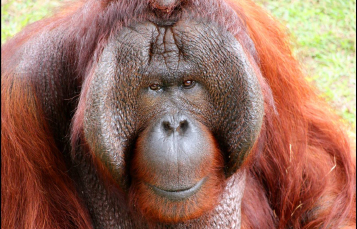Horsty Turns Forty!
2017 was a huge year for our orangutans with the successful birth of our newest addition, Malu! We have especially enjoyed all of you sharing in our excitement and adoration of our little guy. It is great to see how many guests come so eager to see him. This month, however, I want to shift the spotlight to another one of our redheads. Horst is our oldest male orangutan, and, in fact, is the oldest male of his species in North America. On January 31st, he turns 40, which is a massive milestone for a male orangutan!
Turning “the big 4-0” is a reason to celebrate for humans, but why is it so important for Horst? In the wild, a male orangutan only lives into about his late twenties. Horst has already outlived his wild counterparts by about 10 years! Under human care, male orangutans have an average lifespan of mid-40’s. So, what do we do to enhance their longevity? The biggest, and likely most significant, difference is that here, Horst has never and will never have to compete with other male orangutans. Wild males often bear scars or even torn cheek pads that indicate that being a dominant male doesn’t come easily. Here at Busch Gardens, Horst also gets high quality nutrition and veterinary care, in addition to a staff of zookeepers tending to all of his needs!

At 40, Horst is considered to be a senior citizen, and gets other specialized care to ensure a long and comfortable life. Like many geriatric animals and humans, Horst has some arthritis, and receives a daily glucosamine supplement. In addition, we’ve also trained Horst to participate in cold laser therapy. His arthritis is in his shoulders, so he is trained to present his back to us for treatment. For Horst, it’s just a relationship session with his keepers where he gets a back scratch for the duration of the treatment! Horst has also been trained to participate in cardiac ultrasounds, which allow us to monitor his heart health. Just as in humans, heart disease is prevalent in great apes, particularly in larger males like Horst. Busch Gardens participates in the Great Ape Heart Project, which collects data on blood pressure, blood draws, and cardiac ultrasounds to advance heart health for great apes.
“Horsty,” as we affectionately call him, is so special to us. Impressive, gentle, courteous, and sweet, we are thrilled to celebrate such a huge day with him.


